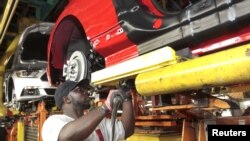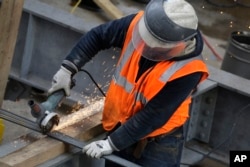Workers are becoming more pragmatic and skillful, as well as less loyal and more likely to look outside the company for job security.
Those are some of the research findings from ADP and other companies that look at changes in the nature of work, new survival strategies for employees, and new issues and tools for managers.
New definition of job security
An ADP survey of thousands of workers around the world shows many now think their prosperity is ensured by the quality of the network of contacts they maintain inside and outside their current company.
Dermot O’Brien, chief human resources officer at ADP, says that is a change from the traditional belief that job security depends on the fate of the worker's employer.
ADP gets its insights by processing millions of paychecks in the United States, from surveys of the global workforce and from its 55,000 employees operating in nearly 40 nations.
Temporary jobs make contacts important
The ADP study says many employees now expect that companies will hire people for specific projects for a certain period of time, rather than signing up permanent workers.
In a VOA interview, O’Brien said workers look beyond "the four walls of the company” and use technology to meet and cultivate colleagues, contacts, and friends who can help them find work in an uncertain future.
Research shows the rising power of technology is driving changes in the workplace and forcing employees to adapt and update their skills. It also indicates companies must change and find better ways to manage workforces are more mobile and technologically literate.
Pressure to recruit skilled employees
According to the ADP study, in return for updating skills and coping with an uncertain future, workers want a flexible workplace, access to skills training, more autonomy, and a chance to work on projects they find meaningful.
While employees already expect the workplace to offer this flexibility and benefits, O’Brien says many companies think these developments will come at some point in the future.
A separate study by the career network Beyond.com argues that in the United States, a “healthy economy with more job opportunities to choose from” will increase competition to recruit and retain the most skillful employees.
That makes it vital to offer an appealing package of pay and benefits, including some help repaying loans that workers have taken to pay the soaring costs of education. A survey of 5,000 U.S. workers shows 29 percent of job seeker respondents with debt currently owe more than $35,000 in student loans; paying down those loans in addition to ordinary living expenses can be difficult.
Debt-repayment assistance is particularly valued by "millennials" — the generation born since 1980 - who are more likely to switch from one employer to another than their predecessors in the workforce.
Fed see tighter job market
The job market may get tighter, according to the vice chairman of the U.S. central bank, Stanley Fischer.
If the unemployment rate goes even lower, Fischer said in a speech Monday, that could help people who fell "stuck" in part-time work find full-time employment. And that would increase competition for employers seeking the best qualified workers.













